Gospel according to the Old Testament Series (18 vols.)
Digital Logos Edition
This important series from noted pastor-scholars fulfills a great need for resources that show how the Old Testament presents and finds its fulfillment in the Gospel of Jesus Christ–not just in occasional Messianic prophecies, but in its essential message. Without falling into arbitrary allegory, the authors of this series present exegetically grounded exposition of Scripture that shows how all Old Testament doctrine and drama is about Christ, even when he is not on stage. The volumes in this collection cover various figures in, and portions of, the Old Testament. Discover the Gospel in the Joseph story, in the books of Judges, Zechariah, Hosea, and Daniel, in the lives of Abraham, Isaac, and Jacob, in the Old Testament presentation of Israel’s worship, and more.

- Christ-centered interpretation of Old Testament figures, stories, and books
- Accessible redemptive-historical exegesis from pastor-scholars
One of the most urgent needs of the church is to grasp how the many parts of the Bible fit together to make one ‘story line’ that culminates in Jesus Christ. This series of books goes a long way to meeting that need. Written at a thoughtful but popular level, it deserves wide circulation.
–D. A. Carson, research professor, Trinity Evangelical Divinity School
At last a series on the Old Testament designed to provide reliable exposition, biblical theology, and a focus on Christ. These books should be like manna in the desert to pastors, preachers, teachers, and many individual Christians who struggle to come to terms with how to read the Old Testament.
–Sinclair Ferguson, senior minister, First Presbyterian Church, Columbia, SC
- Title: The Gospel according to the Old Testament
- Series Editor: Iain M. Duguid
- Series: Gospel according to the Old Testament
- Publisher: P&R
- Volumes: 18
- Pages: 3,884
- Resource Type: Commentaries
- Topic: Biblical Theology
Individual Titles
- Living in the Light of Inextinguishable Hope: The Gospel According to Joseph by Iain M. Duguid and Matthew P. Harmon
- Right in Their Own Eyes: The Gospel According to Judges by George M. Schwab
- Longing for God in an Age of Discouragement: The Gospel According to Zechariah by Bryan R. Gregory
- Love Divine and Unfailing: The Gospel According to Hosea by Michael P. V. Barrett
- From Famine to Fullness: The Gospel According to Ruth by Dean R. Ulrich
- After God’s Own Heart: The Gospel According to David by Mark J. Boda
- Crying Out for Vindication: The Gospel According to Job by David Jackson
- Hope in the Midst of a Hostile World: The Gospel According to Daniel by George M. Schwab
- Salvation through Judgment and Mercy: The Gospel According to Jonah by Bryan D. Estelle
- Living in the Grip of Relentless Grace: The Gospel in the Lives of Isaac and Jacob by Iain M. Duguid
- Immanuel in Our Place: Seeing Christ in Israel’s Worship by Tremper Longman III
- Faith in the Face of Apostasy: The Gospel According to Elijah and Elisha by Raymond B. Dillard
- Living in the Gap between Promise and Reality: The Gospel According to Abraham by Iain M. Duguid
- A Journey to Wholeness: The Gospel According to Naaman’s Slave Girl by Mark Belz
- Severe Compassion: The Gospel According to Nahum by Gregory D. Cook
- Recovering Eden: The Gospel according to Ecclesiastes by Zack Eswine
- From Bondage to Liberty: The Gospel according to Moses by Anthony T. Selvaggio
- Inconspicuous Providence: The Gospel according to Esther by Bryan R. Gregory
This title is included in the following collections
You can save when you purchase this product as part of a collection.
Logos 8 Reformed Gold Legacy L...
$849.99$849.99Logos 9 Reformed Gold Legacy L...
$849.99$849.99P&R Master Bundle (127 vols.)
$1,703.34$1,359.99Logos 8 Reformed Platinum Lega...
$1,499.99$1,499.99
- $1,499.99
- $2,999.99
- $2,999.99
- $4,749.99
- $4,749.99
- $4,749.99
- $21,749.99
- $23,999.99
- $24,999.99
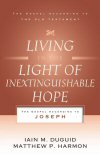
Living in the Light of Inextinguishable Hope: The Gospel According to Joseph
- Authors: Iain M. Duguid and Matthew P. Harmon
- Series: Gospel according to the Old Testament
- Publisher: P&R Publishing
- Publication Date: 2013
- Pages: 272
Learn how the story of Joseph prefigures the gospel. Duguid and Harmon show that, while Joseph did show exemplary character in the matter of Potiphar’s wife and other situations, he was still far from perfect and ultimately is not intended as a moral example for us to follow. Rather, the Joseph story testifies to God’s electing grace and shows how he redeems and restores broken and dysfunctional sinners to accomplish his purposes.
The perfect sequel to Iain Duguid’s explorations of the gospel according to Abraham and according to Isaac and Jacob. In each chapter Duguid and his pastoral colleague Matt Harmon lead us from the study–with strategic insights into each text’s original language, literary artistry, cultural context, and interpersonal dynamics–through the pulpit–with vivid articulation and conscience-searching application to our crooked hearts and broken relationships–to Jesus, whose undeserved suffering on the cross rescues us from destruction, melts our pride, and reconciles the most dysfunctional of families.
–Dennis E. Johnson, professor of practical theology, Westminster Seminary California
Iain M. Duguid (PhD, University of Cambridge) is professor of Old Testament and religion at Grove City College in Grove City, Pennsylvania, and visiting professor of Old Testament at Westminster Seminary California. He is co-pastor of Christ Presbyterian Church (ARP) in Grove City. He has written numerous works of biblical exposition, including Ezekiel in the NIV Application Commentary series, Numbers in the Preaching the Word series, Esther & Ruth in the Reformed Expository Commentary series, and more.
Matthew P. Harmon (MDiv, ThM, Westminster Theological Seminary) is co-pastor alongside Iain Duguid at Christ Presbyterian Church (ARP) in Grove City, Pennsylvania.
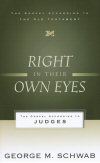
Right in Their Own Eyes explains Judges from three Old Testament and three New Testament perspectives. First, it shows how the Spirit enabled wayward people to fulfill the mission God gave them, promotes David as king of Israel, and illustrates God’s covenant with his people. Schwab then shows how God sovereignly works among his wayward people to forge a community of faith under the New Covenant–realized in Christ–calls modern Christians to faith and obedience, and looks forward to the return of Christ and the final judgment.
George Schwab achieves four goals. First, to be true to the text–to read Judges in its ancient Near Eastern setting, seeing it as a sermon on Deuteronomy and, at times, a possible apologetic for David. Second, to glorify Christ–to read Judges from a biblical-theological perspective, finding that Judges is really all about Christ and his coming kingdom. Third, to lift us up in faith–which happens when we see our sovereign God at work, forging a community of faith from a wayward and idolatrous people. And finally, to call us to change our perspective and take action–why does it matter that faith leads to deliverance? What does a lack of faith in daily life reap in terms of oppression, and how does the message of judges make a difference?
In Right in Their Own Eyes, George Schwab takes readers on a journey into an ancient textual world that is at times jarring to modern sensibilities. He is a fascinating tour guide with an accessible style of delivery who does not avoid the difficult texts, making clear their meaning within their original era of redemptive history before tracing their significance for Christian readers today.
–Mark J. Boda, professor of Old Testament, McMaster Divinity College, Hamilton, Ontario, Canada
George M. Schwab (MDiv, PhD, Westminster Theological Seminary) is associate professor of Old Testament at Erskine Seminary. He is also a teaching elder and a trained biblical counselor. Dr. Schwab has written numerous articles in Old Testament studies and coauthored the Cornerstone Biblical Commentary: The Book of Psalms, the Book of Proverbs.
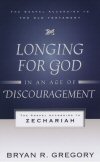
Many in our churches find themselves in need of renewal yet are discouraged by the church’s lack of impact on the world and culture. The book of Zechariah addresses God’s people in just this situation–discouraged and in need of renewal. In doing so, it provides a captivating vision of God and his work in the world, leading readers into a deeper longing for God and the coming of his kingdom, which finds its realization in Christ.
Bryan Gregory’s Longing for God in an Age of Discouragement makes the biblical message of Zechariah accessible to all, It provides disciplined, yet understandable exegesis of this prophet’s message, which is then traced through the broader redemptive drama climaxing in Jesus and intersecting the lives of his followers today. Such interpretation is a timely gift to a church living through challenging times.
–Mark J. Boda, professor of Old Testament, McMaster Divinity College, Hamilton, Ontario, Canada
Bryan R. Gregory is Senior Pastor of First Associate Reformed Presbyterian Church in Burlington, NC
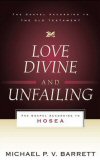
Love Divine and Unfailing: The Gospel According to Hosea
- Authors: Michael P. V. Barrett
- Series: Gospel according to the Old Testament
- Publisher: P&R Publishing
- Publication Date: 2008
- Pages: 240
After establishing the historical and theological backdrop for Hosea, Barrett focuses on the connection between Hosea’s marriage to Gomer and the Lord’s marriage to his people. Though many were deaf to Hosea’s preaching, even the dullest could see his grief, sympathize with his sorrow, and wonder at his persistent love. Hosea’s marriage was a living sermon: What Hosea did for Gomer, God did for Israel; What Gomer did to Hosea, Israel did to God. In Christ’s redemptive work, God’s love for his people and justice against their sin are reconciled. Christ is the divine bridegroom and we are his bride, whom he redeems from the filth of sin and restores to himself by incomprehensible love.
Love Divine is a clear, honest, panoramic treatment of the book of Hosea, poignantly showing how Hosea and Gomer’s treatment of each other reflected God and Israel’s treatment of each other. Dr. Barrett excels in unfolding his views logically on solid exegetical, hermeneutical, and theological grounds. The book is compelling in its Christ-centeredness and is a masterpiece in expounding God’s loving and gracious covenant in its internal and external dimensions. Love Divine is also true to the personal experience of covenantal grace in the lives of believers. All of this makes it a sheer delight to read. Every pastor should study Love Divine before preaching from the book of Hosea, and every Christian will find it enlightening and God-glorifying.
–Joel R. Beeke
Michael P. V. Barrett (MA, PhD Bob Jones University) is president of Geneva Reformed Seminary, the theological seminary of the Free Presbyterian Church of North America. He is also an ordained minister in the FPC serving as an associate minister of Faith Free Presbyterian Church in Greenville, SC.
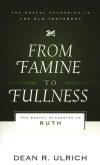
Whether they are thrilled by the love story of Ruth and Boaz or encouraged by a happy ending for Naomi, many people are drawn to the book of Ruth. But though the story is indeed charming, Ruth is included in Scripture for more than our entertainment. Ruth’s message is theological, rooted in God’s oversight of the movement of redemptive history that climaxes in the person and work of Jesus Christ.
This lively book with rich Gospel content is written in a lucid style that communicates easily to pastors and laity alike. It explains how the story of Ruth is part and parcel of the redemptive history that extends from Genesis to Revelation: The good news that God has provided our Kinsmen-Redeemer, Jesus Christ, who grants us the forgiveness of sins and the inheritance of resurrection to everlasting life. God worked through ordinary Old Testament believers in distressing situations to bring about redemption for a Moabite who became an ancestress to Christ. Our time of suffering too are opportunities for God to strengthen our faith and work through us to bring salvation to others.
–Christopher W. Mitchell, Marion E. Wade Chair of Christian Thought, Wheaton College
Dean R. Ulrich (PhD, Westminster Theological Seminary) has been pastor of a PCA church in the Pittsburgh area and associate professor of Old Testament at Trinity Episcopal School for Ministry in Ambridge, Pennsylvania. His articles have been included in the Journal of Biblical Counseling, Journal of the Evangelical Theological Society, and Westminster Theological Journal.
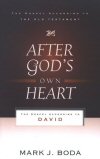
With lucid insights on every page, After God’s Own Heart examines the life of David, showing how the Old Testament king relates to anointing, covenant, the temple, and sin. Ultimately, however, the author shows how David pictures the Messiah to come. This volume in the Gospel According to the Old Testament series includes questions for individual or group study.
After God’s Own Heart is an excellent contribution to an important series on the biblical theology of the Old Testament. As Mark Boda shows in this useful and accessible book, the house of David is central to the Bible’s message of salvation. Using a thematic approach that is well informed by careful scholarship, Boda explores David’s many connections to Christ and to the church as the covenant community of David’s Son.
–Philip Graham Ryken, pastor, Tenth Presbyterian Church, Philadelphia
Mark J. Boda (MDiv, Westminster Theological Seminary; PhD, University of Cambridge) is chair of Old Testament at McMaster Divinity College in Hamilton, Ontario. He is the author or editor of several works, including the IVP Dictionary of the Old Testament: Prophets and Translating the New Testament: Text, Translation, Theology.
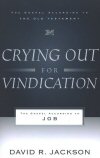
With gripping interpretation and excellent anecdotes, this book links Job’s experience with the gospel, showing that his hope was the same as ours today. In Jesus, our questions and confusions are resolved, our faith vindicated, and our suffering redeemed.
Why do the innocent suffer? Drawing upon his years of pastoral ministry, David Jackson takes us on an interesting journey where we experience, along with Job, “the depth of God’s grace to us in Christ–who, by his own choice, suffered more than Job to save us from the cruelty and domination of sin.” This book is a ‘must read’ for anyone going through difficult times.
–Steven Horine, Calvary Baptist Seminary, Lansdale, PA
David Jackson (MDiv, ThM, Westminster Theological Seminary; PhD, University of Sydney) is head of biblical studies at William Carey Christian School, Australia, and an honorary associate at the University of Sydney.
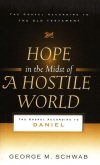
Like Daniel and the Israelite exiles in Babylon, we too are strangers and exiles in this world. We too are waiting for the coming of the Son of Man, who has received the kingdom from the Ancient of Days, to establish his kingdom on earth. Schwab demonstrates how believers living among unbelievers, and as citizens of countries with increasingly hostile governments, have opportunity to reveal God-inspired wisdom and discover hope as they look to Christ.
God reveals the future to affect the present. Prophecy glorifies the One in control, inspires believers’ confidence, intensifies hope for God’s will to be done, and moves people to repentance and holiness. This study of the book of Daniel highlights these essential aspects of prophecy. Given the mysterious symbolism throughout Daniel, not every reader will agree with Schwab’s interpretation of this or that detail. But his focus is clear: God’s absolute control and unrelenting resolve to accomplish his redemptive purpose in Christ should give God’s people in every age ‘hope in the midst of a hostile world.’
–Michael P. V. Barrett, president, Geneva Reformed Seminary
George M. Schwab (MDiv, PhD, Westminster Theological Seminary) is associate professor of Old Testament at Erskine Seminary. He is also a teaching elder and a trained biblical counselor. Dr. Schwab has written numerous articles in Old Testament studies and coauthored the Cornerstone Biblical Commentary: The Book of Psalms, the Book of Proverbs.
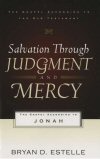
Though simple enough for a child to grasp, the book of Jonah is an extremely subtle and complex work full of wonderful literary artistry mixed with many layers of meaning. This study presents the book of Jonah as part of the unfolding, unified story of redemption pointing to Christ. Pastors, seminarians, and thoughtful readers interested in how the Old Testament points toward Christ will appreciate this new study of Jonah.
Bryan Estelle combines biblical-theological, historical, and literary insights to illuminate the message of Jonah. He shows us Christ in each movement of the story and guides us to respond in faith and obedience.
–Mark Futato, Robert L. Maclellan Professor of Old Testament, Reformed Theological Seminary, Orlando
In this section-by-section reading of Jonah, Estelle offers a valuable blend of insights into the ancient Near Eastern setting of the book, interaction with its literary and theological subtleties, and relevant contemporary insights. Above all, he presents Christocentric reflections throughout, guiding the reader to see ‘the One who is greater than Jonah.’
–Michael Kelly, assistant professor of Old Testament, Westminster Theological Seminary
With a sharp eye to the intricate literary workings and multifaceted theological meanings of the book of Jonah, Estell achieves a fine balance between textual exposition and contemporary application. Careful to avoid allegorization and resistant to the claim that finding Christ in the book constitutes a Christian ‘colonization’ of the Old Testament, Estelle offers a well-reasoned and circumspect Christological reading of Jonah.
–V. Philips Long, professor of Old Testament, Regent College
Bryan D. Estelle (MDiv, Westminster Seminary California; PhD, Semitic and Egyptian languages and literature, The Catholic University of America) is professor of Old Testament at Westminster Seminary California.
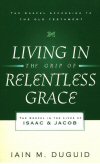
“Our God delights in writing straight with a crooked pencil,” says Iain Duguid. The lives of Isaac and Jacob are vivid examples of that principle. Time and again God displays his grace and glory by overcoming their weakness and sinfulness. In this latest addition to the Gospel according to the Old Testament series, we see once more how the message of Scripture converges on Jesus. Readers can take encouragement in the midst of their own shortcomings that the gospel triumphs not through human might or goodness but through God’s relentless grace.
Iain Duguid is both a first-class scholar and a gifted preacher. This book is theologically astute, Christ-centered, and extremely practical. A tremendous resource.
–Timothy J. Keller, founding pastor, Redeemer Presbyterian Church, Manhattan
Iain M. Duguid (PhD, University of Cambridge) is professor of Old Testament and religion at Grove City College in Grove City, Pennsylvania, and visiting professor of Old Testament at Westminster Seminary California. He is co-pastor of Christ Presbyterian Church (ARP) in Grove City. He has written numerous works of biblical exposition, including Ezekiel in the NIV Application Commentary series, Numbers in the Preaching the Word series, Esther & Ruth in the Reformed Expository Commentary series, and more
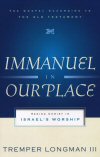
This book provides fascinating insights into the Old Testament tabernacle and temple, the priesthood, the sacrifices, and festivals. More than that, it shows how Jesus is the fulfillment of Old Testament sacred space, sacred acts, sacred persons, and sacred time. An aid to pastors, teachers, and laymen in teaching and reading the Old Testament, this work will enrich our understanding of Christ and deepen our worship.
Old Testament conceptions of worship must be understood in light of how the death and resurrection of Christ bring these conceptions to a heightened sense of clarity and fulfillment. Longman creatively and clearly brings together the Old Testament data within such a biblical theological grid. His insights will be of immediate relevance for Christians concerned about the nature of worship not only in the Old Testament but also today.
–Peter Enns, professor of Old Testament, Eastern University
Christians struggle in understanding the relevance of large parts of the Old Testament. This is particularly true of matters concerning the worship of ancient Israel. In this beautifully conceived work, Longman has illuminated the priestly material of the Old Testament in a way that makes it theologically relevant for today. I heartily recommend this work.
–Bruce K. Waltke, professor of Old Testament, Knox theological Seminary
Tremper Longman III (MDiv, Westminster Theological Seminary; PhD, Yale University) is Robert H. Gundry Professor of Biblical Studies at Westmont College. He has written widely on biblical interpretation, including An Introduction to the Old Testament (with Raymond B. Dillard) and many others.
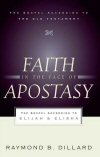
In this helpful volume, Raymond B. Dillard explains the stories of Elijah and Elisha in the context of redemptive history. As prophets of God, Elijah and Elisha sought to restore God’s covenant with his wayward people. They pointed forward to a better prophet to come who would satisfy the terms of the covenant despite Israel’s covenant breaking. In the power and spirit of Elijah, John the Baptist came to prepare the way of the better prophet, Jesus Christ, who alone can restore God’s people in the better New Covenant through his life, death, and resurrection. Written for laypeople, study groups, and pastors, this study of the lives of Elijah and Elisha shows how the Old Testament accounts direct us to faith in Christ today.
The Old Testament stories of Elijah and Elisha are as fascinating as they are puzzling, and Christian readers will be delighted to find in this book just the help they need. Few writers combine scholarly expertise and theological good judgment as the late Ray Dillard did . . . highly recommended for anyone who wishes to understand Old Testament narrative.
Moisés Silva, former professor, Westmont College, Westminster Theological Seminary, and Gordon-Conwell Seminary
Raymond B. Dillard (MDiv, Westminster Theological Seminary; PhD, Dropsie University) was professor of Old Testament at Westminster Theological Seminary until his death in 1993. He was the author of 2 Chronicles in the Word Biblical Commentary Series, and, with Tremper Longman III, An Introduction to the Old Testament.
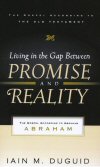
In this insightful volume, Duguid pulls the reader into the dramatic unfolding of the story of Abraham as a significant stage in the larger story of salvation. Written for lay-people, study groups, and pastors, this lively survey of Abraham’s faith (and failures) shows us how the Old Testament patriarch foreshadows the perfect saving work of Christ. The story of Abraham was not intended merely as a moral example for us to follow. In fact Abraham often demonstrated a wavering moral character. More fundamentally, Abraham is an example of sinners saved through faith by God’s demerited grace. When entering into a covenantal relationship with Abraham and his household, God passed alone through the animal carcasses showing that his relationship with Abraham was not dependent on Abraham’s performance, but was received by grace alone through faith alone. In this way, the story of Abraham culminates in the work of Jesus in which he took the curses of the covenant upon himself and secured covenantal union between God and his people by grace alone, through faith alone.
Jesus explained that all the Scriptures that had preceded him were about him. This means that if we preach or teach on any passage of the Old Testament and do not speak of him, we fail to mention the very thing that Jesus said the passage is about . . . I am grateful for this immensely accessible book . . . which closes the gap between Christ’s redemptive work and the life of Abraham.
–Bryan Chapell, distinguished professor of preaching, Knox Theological Seminary
Prof. Duguid’s The Gospel According to Abraham significantly helps Christians to see that Abraham is an important figure on the road that leads to the Lord Jesus Christ. The Author pulls the reader into the dramatic unfolding of the story of Abraham as a significant stage in in the larger story of salvation
–Willem A. VanGemeren, professor of Old Testament and Semitic languages, Trinity Evangelical Divinity School
Iain M. Duguid (PhD, University of Cambridge) is professor of Old Testament and religion at Grove City College in Grove City, Pennsylvania, and visiting professor of Old Testament at Westminster Seminary California. He is co-pastor of Christ Presbyterian Church (ARP) in Grove City. He has written numerous works of biblical exposition, including Ezekiel in the NIV Application Commentary series, Numbers in the Preaching the Word series, Esther & Ruth in the Reformed Expository Commentary series, and more
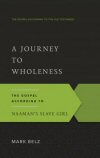
This book focuses on biblical reconciliation, both in its primary sense (as Paul uses it) and in a secondary sense, insofar as it touches on reconciliation between races, rich and poor, Jew and Gentile, the powerful and the weak, and between other alienated groups. The focus of the book is Naaman, a Syrian general, and his Jewish slave girl, whose simple testimony helped to bring about a great work of reconciliation: the salvation of her Syrian master. As the story unfolds, God’s saving power is displayed, particularly in bringing light to the Gentiles and in demonstrating the free offer of the gospel. Many Christians identify Naaman’s story with his miraculous healing in the Jordan River but fail to see the greater truth of God’s love for the Gentiles and the breadth of the gospel’s reach. Mark Belz brings understanding and encouragement to us as we see God’s great mercy at work.
Using this beautiful Old Testament presentation of the gospel, Mark Belz woos us to be reconciled to God and man.
—George Robertson, pastor, First Presbyterian Church, Augusta, GA
This is a book that lingers. . . . This riveting read is now on my list of favorite books.
—Susan Hunt, conference speaker, author, and former director, Women’s Ministries in the Church (PCA)
Mark Belz (MDiv, Covenant Theological Seminary) has served as moderator of the General Assembly of the Presbyterian Church in America.
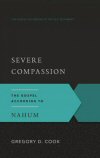
Gregory Cook helps readers navigate the book of Nahum, a poetic masterpiece that teaches about God’s love for his adulterous people. As the prophet Nahum teaches, God’s passionate love threatens all our other loves. When we find God boring and the world fascinating, we commit the sin of rebellion—but God, with severe compassion, refuses to abandon us when we stray into destructive paths. Ultimately, Nahum’s prophecy is fulfilled in Christ, who relentlessly pursued his people and entered history in order to redeem them for himself. Cook further develops his rich description with historical background, cultural references, literary allusions, poetic devices, and challenging application.
Greg has done the hard work of digging into the Hebrew text; he has gleaned insights from scholars and learned about the world and time in which Nahum wrote; he has sat with and listened carefully and humbly to the text; he has seen and appreciated how it speaks about and points to Jesus; and he has then gone on to consider how its message speaks to us today as people in union with Christ.
—Elizabeth Groves, lecturer in Old Testament, Westminster Theological Seminary
Gregory D. Cook has completed a PhD in hermeneutics and biblical interpretation from Westminster Theological Seminary, prior to which he was the pastor of Providence Presbyterian Church (PCA) in West Virginia and the youth and college pastor at Evangelical Presbyterian Church (PCA) in Delaware.
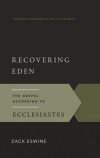
The preacher in Ecclesiastes reminds readers that life under the sun does not happen according to neat and tidy rules. This biblical author asks us to see the world around us in all its messiness. He then explores what that reveals about humanity, our world, and our God. Rather than avoiding addressing deep questions of life, he answers with an affirmation of the universality of suffering and implications regarding the finiteness of earthly existence. This commentary explores Ecclesiastes as a meditation that engages people where they are, one that draws them to the God who enters their world and who works their redemption.
A pastorally poetic guide to the endlessly ‘wild and strange wonder called Ecclesiastes’. . . . Be sure to reflect on the weighty questions that Zack provides after each chapter. They offer the reader a timely opportunity to respond to the author’s thoughtful observations of an ultimately hopeful text.
—Donald C. Guthrie, director of the PhD (Educational Studies), professor of educational ministries, The Jeanette L. Hsieh Chair of Educational Leadership, Trinity Evangelical Divinity School
Zack Eswine (BSW, Ball State University; MDiv, Covenant Theological Seminary; PhD, Regent University) is lead pastor of Riverside Church in St. Louis. He formerly served as assistant professor of homiletics and the director for the Doctor of Ministry program at Covenant Theological Seminary and was a campus minister with the Navigators.

It is difficult to overestimate Moses’ importance to the unfolding of God’s plan of salvation. Moses is arguably the most significant Old Testament figure because of his unique role as mediator of the old covenant. In this sense, Moses is a precursor to Jesus Christ who is the mediator of a new and better covenant. This insightful volume focuses on the redemptive-historical aspects of Moses’ life and ministry as manifested in the books of Exodus, Numbers, and Deuteronomy.
Nowhere does the theme of redemption shine more brightly in the Old Testament than in Exodus. Anthony Selvaggio draws us into the story of Moses in a most personal way. In concise and stirring chapters, he shows us the beauties of the Lord Jesus and teaches us practical lessons about godliness.
—Joel R. Beeke, president, Puritan Reformed Theological Seminary, Grand Rapids
If you have wondered what Scriptures Jesus might have cited when he showed his disciples the things concerning himself ‘beginning with Moses’ (Luke 24:27), Anthony Selvaggio provides a significant part of the answer.
—Dennis E. Johnson, professor of practical theology, Westminster Seminary California
Anthony T. Selvaggio (JD, The University of Buffalo School of Law; MDiv, Reformed Presbyterian Theological Seminary) is an ordained minister, a lawyer, an author, a lecturer, and a visiting professor at Ottawa Theological Hall in Ottawa, Canada. Previously he was a visiting professor at the Reformed Presbyterian Theological Seminary in Pittsburgh and was Theologian in Residence at the Rochester Reformed Presbyterian Church. He edited and contributed to The Faith Once Delivered: Essays in Honor of Dr. Wayne R. Spear.
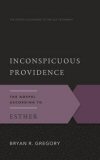
The book of Esther often seems like an anomaly. This book of the Bible never overtly mentions God or his direct intervention. However, Esther’s story feels closest to many Christians’ own experience. Few have experienced a dramatic divine intervention. Our world today seems just as secular as Esther’s did then. Moderns are tempted to ask of her world and our own—where is God in all this? If he is real, why doesn’t he show himself?
Bryan Gregory reveals to his readers how Esther’s literary techniques depict God’s “absent presence” and “hidden involvement.” These subtle devices remind readers that while God appears uninvolved, he is at work behind the scenes to accomplish his purposes and to deliver his people—ultimately making himself clearly known in Christ.
It is a blessing when scholarly research results in deep insights for practical, everyday faith. Here you will find real, concrete hope in Christ that calls you to faith and action and that speaks even to despair and life’s darkest moments.
—Elizabeth Groves, lecturer in Old Testament, Westminster Theological Seminary
Bryan R. Gregory is senior pastor of Brookdale Presbyterian Church in St. Joseph, Missouri.
Iain M. Duguid (PhD, University of Cambridge) is professor of Old Testament and religion at Grove City College in Grove City, Pennsylvania, and visiting professor of Old Testament at Westminster Seminary California. He is co-pastor of Christ Presbyterian Church (ARP) in Grove City. He has written numerous works of biblical exposition, including Ezekiel in the NIV Application Commentary series, Numbers in the Preaching the Word series, Esther & Ruth in the Reformed Expository Commentary series, and more.
Reviews
2 ratings

Dr Vincent Coleman
5/3/2019

Mark Trigsted
10/12/2018
This is a fantastic set... It the spirit of Graeme Goldsworthy, this is a collection of Biblical Theology studies that show the working of the Grace of God through both Testaments.
Ralph Bass
10/5/2018

Chris Clanton
4/30/2018
Just purchased and they seem wonderful, but not all of them will link with a bible text. Some do, some don't... kind of frustrating. I understand how some of the titles might not exactly warrant it, but "After God’s Own Heart: The Gospel According to David by Mark J. Boda" should and so should several others. Maybe my intentions of treating them more like a commentary and reading pieces as I read the text was farfetched. If this can be updated that would be wonderful!